It is safe to say that in 2025, leveraging Business Intelligence solutions is no longer an option, but rather an essential part of health information management for companies that expect to remain at the top of the industry. According to the survey by USC Price, 60% of healthcare executives respondents are already utilizing data analytics initiatives, and 42% of them report improved patient satisfaction, while 39% experience significant cost savings. While the survey results sound solid and promising, leveraging Business Intelligence in healthcare requires a professional approach that balances tech-saviness with a business mindset. This article, in turn, can serve as an ultimate guide to adopting business intelligence software for healthcare, its advantages, use cases, best practices and implementation challenges.
What Is Business Intelligence in Healthcare?
Healthcare Business Intelligence refers to the usage of data-driven insights to improve the decision-making, performance, and patient outcomes. This process is based on the analysis of real-time and historical data from different sources, including Electronic Health Records (EHRs), financial reports, and operational workflows.
Healthcare Business Intelligence works by gathering data from various sources (like patient records, hospital operations, and financial systems), organizing it into a unified system, and then visualizing key insights through interactive dashboards. These dashboards help doctors, administrators, and decision-makers track performance, spot trends, and compare results against industry benchmarks.
Key components of Healthcare BI include:
- Data Integration and Aggregation
- Interactive Dashboards and Visualization
- Performance Tracking and Benchmarking.
Healthcare Analytics and Business Intelligence – What’s the Difference
While Business Intelligence and healthcare analytics are often used interchangeably, there are key differentiators, as they serve different purposes:
- Healthcare BI is primarily aimed at descriptive and diagnostic analytics, providing insights to monitor and improve existing operations, trends, and performance.
- Healthcare Analytics goes beyond the current situation and offers predictive and prescriptive analytics capabilities to forecast future trends and recommend action.
The Add-on Value of Business Intelligence for Healthcare
Business Intelligence tools bring immense value to medical professionals. In 2025, we can already highlight specific advantages they bring to organizations since the global BI Healthcare market almost tripled in size from USD 4.4 billion in 2018 to USD 11.97 billion in 2025.
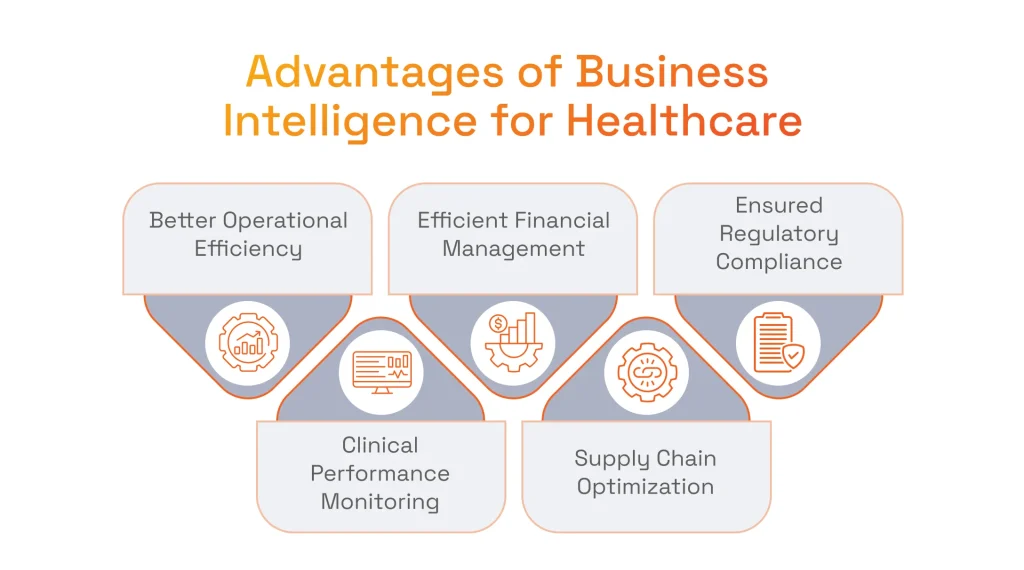
Better Operational Efficiency
BI tools help to improve typical workflows, optimize staff scheduling, and make better decisions in patient care by leveraging real-time data streams from EHRs, IoT devices, and hospital management software. Innovations like AI-based automation and advanced predictive analytics capabilities allow for removing recurring bottlenecks and boosting critical processes’ efficiency.
Learn about more AI for Business Intelligence applications in our featured article!
More Efficient Financial Management
Financial departments, powered by AI, receive additional opportunities for tracking revenue cycles, detecting fraudulent activities, and automating claims processing. Hospitals gain significantly better visibility into financial performance while improving budgeting accuracy, which leads to increased revenues.
Ensured Regulatory Compliance
Helping with this critical component of any healthcare institution, Business Intelligence tools allow for improving compliance metrics tracking, sharpening patient data security monitoring, and automating reporting ensuring adherence to the current industry regulations. Data governance frameworks and automated audit trails help organizations to easily maintain compliance with minimized risks.
Data-Enabled Clinical Performance Monitoring
Business Intelligence developers create solutions for continuous monitoring of clinical performance, which leads to improved treatment pattern identifications, better physician efficiency assessment, and improved patient outcomes as a result. Thanks to advanced BI solutions, clinical administrators can evaluate KPIs and deliver medical practices that are based on evidence.
Supply Chain Optimization
Technological Business Intelligence healthcare solutions can be integrated with existing supply chain management software to ensure the timely availability of vital medical supplies. Implementing Artificial Intelligence for supply chain optimization can add such functionality as demand forecasting or stock management to prevent shortages and waste. The healthcare industry can also benefit from the ways Artificial Intelligence improves logistics since the technology helps to optimize the delivery of medical supplies as well.
Dmytro Tymofiiev
Delivery Manager at SPD Technology
“It is important to mention that while these benefits are fundamental, it is only the tip of the iceberg. Custom solutions for Business Intelligence in the healthcare industry can become a catalyst for a complete transformation of a particular organization, introducing entirely new revenue streams and business models. For example, hospitals can use BI and data science systems to dive into telemedicine or set up remote patient monitoring services, expanding the list of offerings.”
Real-World Applications of Business Intelligence Healthcare
The global market of Business Intelligence software for healthcare is expected to reach USD 11.41 billion by the end of 2025. Let’s take a look at the reason behind this massive number by discussing examples of Business Intelligence in healthcare.
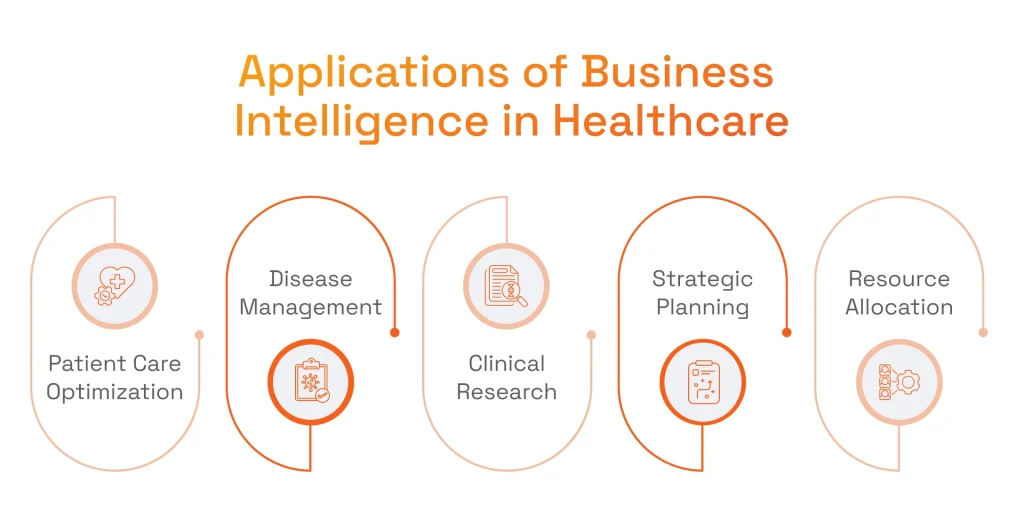
Patient Care Optimization
On average, one hospital can generate up to 50,000 terabytes of data in a day. The best Business Intelligence software for healthcare helps to make the most out of this information, improving the overall efficiency of internal processes and patient experience. In particular, resource allocation can be significantly improved, removing long wait times and delayed diagnoses. The patient flow can be monitored and adjusted in real-time, while leveraging predictive analytics can help with early disease detection. Adding AI to the mix allows for automated treatment recommendations, elevating patient care even higher.
Keep your finger on the pulse of the latest trends and find out how generative AI transforms healthcare in our latest article!
Disease Management
Public health organizations benefit greatly from disease trends tracking and identification of potential outbreaks. Modern Business Intelligence healthcare platforms can effectively analyze EHRs, lab results, and population health data to identify patterns and optimize disease prevention strategies, lowering mortality rates.
Clinical Research
Clinical trial Business Intelligence helps to enhance patient selection and greatly accelerate the drug development process. This process requires rigorous analysis of vast amounts of data from trials, patient histories, and genetic studies, which take a lot of time and effort when done solely by human experts. Healthcare Business Intelligence for clinical research improves the speed and consistency of data processing and enhances the process with predictive capabilities.
Strategic Planning and Resource Allocation
Healthcare Business Intelligence supports strategic planning and resource allocation by analyzing patient data, operational efficiency, and financial trends to guide decision-making. BI helps hospitals predict patient admission rates, optimize staff scheduling, and allocate medical resources efficiently based on real-time and historical insights. This ensures better financial management, reduced operational waste, and improved patient care by aligning resources with actual demand.
Examples of Business Intelligence in Healthcare
Here are key examples of the value that solutions in the healthcare Business Intelligence market bring:
- Hospitals and Clinics: can monitor patient wait times, optimize emergency room (ER) capacity, as well as dramatically improve staffing efficiency.
- Health Insurance Providers: become much better at fraud detection by analyzing claims data and suspicious activities.
- Pharmaceutical Companies: improve tracking of drug sales performance and are much more effective at identifying emerging market demand trends.
- Public Health Agencies: optimize vaccination distribution and predict healthcare crises by monitoring disease outbreaks.
Healthcare BI Tools and Technologies
The heart of modern Healthcare Business Intelligence tools is a comprehensive technology stack for collecting, processing, and analyzing information. Let’s review the essential tech stack relevant in 2025.
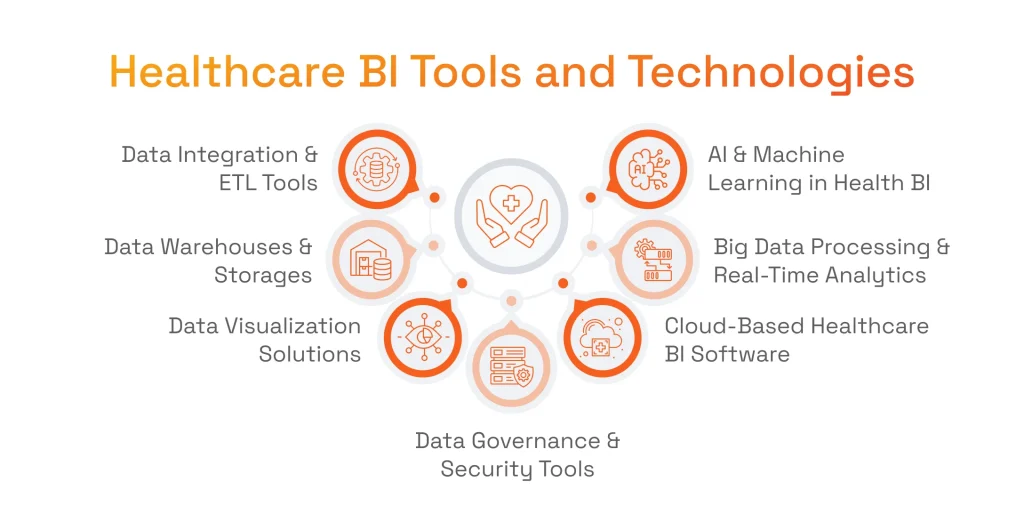
Data Integration & ETL BI Tools for Healthcare
Extract, Transform, Load (ETL) tools are critical for consolidation of data from multiple sources, as they help to deal with data silos, inconsistencies, and incomplete patient records. Among the top solutions that help to ensure that health information is accurate and structured are:
- Talend
- Apache Nifi
- Informatica.
Healthcare Data Warehouses & Storage Solutions
Another critical component of effective Business Intelligence and analytics in Healthcare is a well-structured data warehouse. The most popular solutions for data warehousing, that help to improve performance, organize data and gain actionable historical insights include:
- Amazon Redshift
- Google BigQuery
- Snowflake.
Do you want to learn more about data analytics in healthcare?
Feel free to explore our featured article for more details and insights from our projects!
Data Visualization Healthcare BI Solutions
The information in its raw state is very difficult to interpret, delaying reporting and decision-making for healthcare organizations. To solve this problem, there are powerful visualization tools that help turn sophisticated information into interactive dashboards and transparent reports. The most prominent providers of Business Intelligence dashboard for healthcare include:
- Tableau
- Power BI
- Qlik Sense.
Data Governance & Security Tools
Adhering to the strictest regulations is mandatory in the healthcare industry, and there are specific tools that help to avoid data breaches, prevent possible violations, and elevate operational efficiency. Among the leading solutions for data protection and regulatory compliance include:
- Collibra
- IBM InfoSphere
- Alation.
AI & Machine Learning in Health BI
In addition to other prominent applications of AI and ML in healthcare, this technology further enhances Business Intelligence by transforming it from a historical data analysis tool into a predictive and real-time analytics system. Ready-made BI platforms leverage real-time data processing and machine learning models to identify early disease patterns, streamline hospital operations, and personalize patient treatments for more proactive healthcare management. The most interesting solutions are represented by:
- TensorFlow
- PyTorch
- IBM Watson Health
According to one of our clients, Morningstar, global AI influence on the healthcare market is expected to reach $148 billion by 2029, so we should be ready for more advanced tools in the future of BI in Healthcare.
Big Data Processing & Real-Time Analytics
The healthcare industry fully capitalized on the business impact of Big Data, as there are massive chunks of real-time data generated from EHRs, IoT devices, and medical imaging systems. It creates a necessity for efficient Big Data processing at high speed, real-time monitoring, and precise data analytics. Technologies that help with this include:
- Apache Spark
- Hadoop
- Kafka.
Cloud-Based Healthcare BI Software
Having a healthcare Business Intelligence platform in the cloud allows for scalability, peak cost efficiency, and seamless remote access for clinical data analysts. Cloud platforms are a great alternative to on-premise BI systems, which typically struggle with very high maintenance expenses, limits in accessibility, and become outdated very quickly. Off-the-shelf platforms that include clinical Business Intelligence capabilities include:
- Microsoft Azure Healthcare
- Google Cloud Healthcare API
- AWS HealthLake.
Dmytro Tymofiiev
Delivery Manager at SPD Technology
“Preparing for the implementation of Business Intelligence and analytics for Healthcare organizations requires a combination of data integration, warehousing, analytics, visualization, and security tools. The right decisions in picking the correct BI tools depend on the business goals, the size of the organization, and compliance requirements. We strongly recommend consulting an experienced vendor for assistance in implementing any type of medical Business Intelligence solution.”
Custom vs Ready-Made Business Intelligence Software for Healthcare
The choice between off-the-shelf healthcare BI tools and a custom-built solution is critical to implementing the innovation. Both approaches have their respective advantages and disadvantages, so to make the right decision you need to consider multiple factors including budget, plans for future scalability, compliance requirements, and your company’s specific needs.
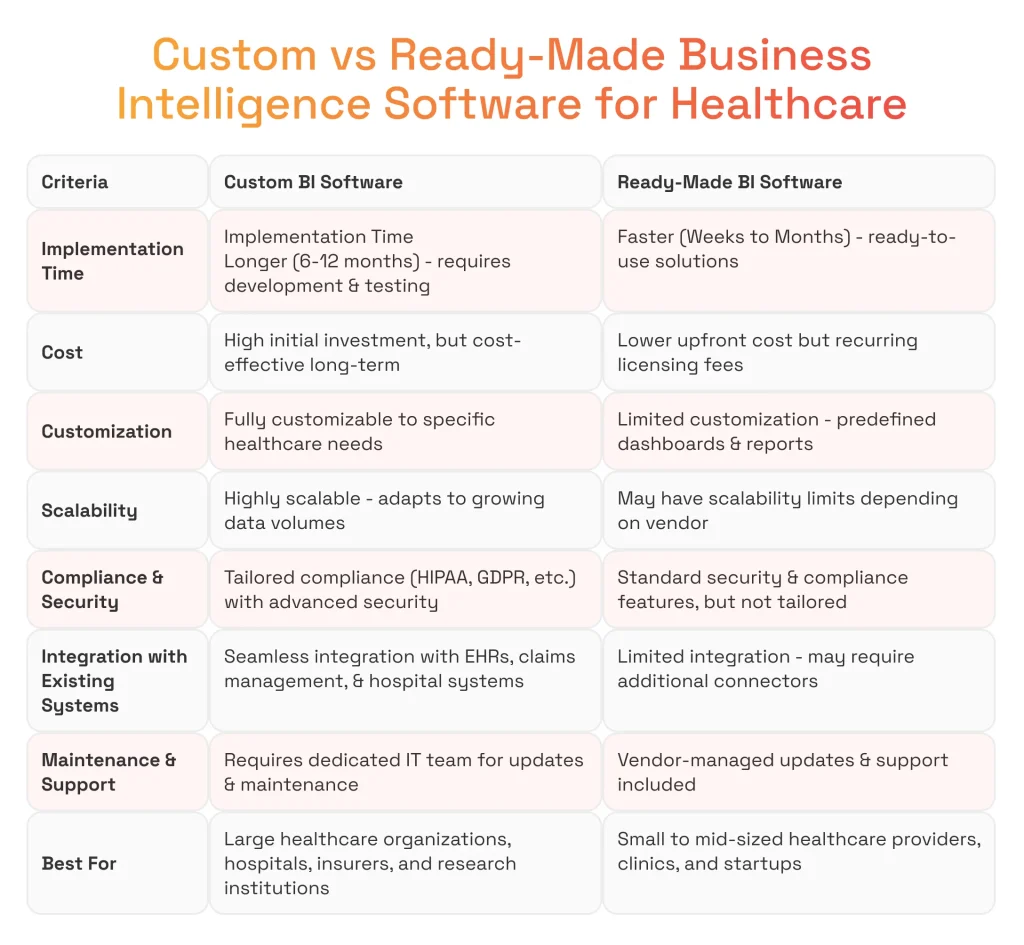
Custom BI Software
The biggest advantage of custom health BI systems is that they are tailored to the requirements of a client, and each of their functional aspects is targeted to achieve a particular goal. While working with a professional vendor, you can expect seamless integration with existing EHR, billing, medical imaging, and IoT devices, as well as alignment with specific enterprise data management strategies.
The vendor will be able to tailor the solution to meet the highest regulatory standards by leveraging advanced security protocols. From the financial standpoint, the custom solution will turn into a lucrative long-term investment, since any recurring subscription fees related to using third-party software will be absent here.
With a custom Business Intelligence solution, you should expect significant upfront investments, since developing software from scratch requires a lot of effort. You should also expect a long implementation time, which will be spent on design, development, and testing. You will also need narrow experts, including proficient BI developers and data engineers.
While custom development can help healthcare businesses of any size, it is the best fit for large organizations with the necessary budgets, massive workloads, and complex infrastructures that require individual approaches.
Ready-Made BI Software
In contrast to custom solutions, off-the-shelf healthcare Business Intelligence software can be deployed in the shortest time possible, with minimal time for setup. In addition to that, licensing an existing tool by paying subscription fees is far cheaper compared to a custom solution. There is a certain degree of reliability for popular solutions since they are constantly being tested in real-world situations on a global scale. You can also expect timely technical support for common issues thanks to ongoing updates and security patches.
On the drawback side is the limitation of ready-made solutions to cater to specific, unique workflows and data structures. In this case, there is a risk of facing a roadblock with integration if an existing solution does not support a specific medical device or EHR system. In this scenario, custom coding still can be required, to fix a particular issue.
You should be ready for significant licensing fees and usage-based billing, which can grow enormously over time. Moreover, there can be security and compliance issues, as pre-built Business Intelligence healthcare solutions may not fully address the necessary regulatory requirements.
Going with ready-made software is an affordable option for small-to-mid-sized companies and startups. However, it is still recommended to consider custom development, that even in smaller organizations, unique functionality and integrations may be required.
Making Your Hospital Ready for Healthcare BI Adoption
In most cases, implementing Business Intelligence software in healthcare is much more than integrating tools, but rather transformation and adjustment of critical operations. Proper adoption of BI requires a thought-out, strategic approach that will ensure goal alignment, data integrity, and the strongest security.
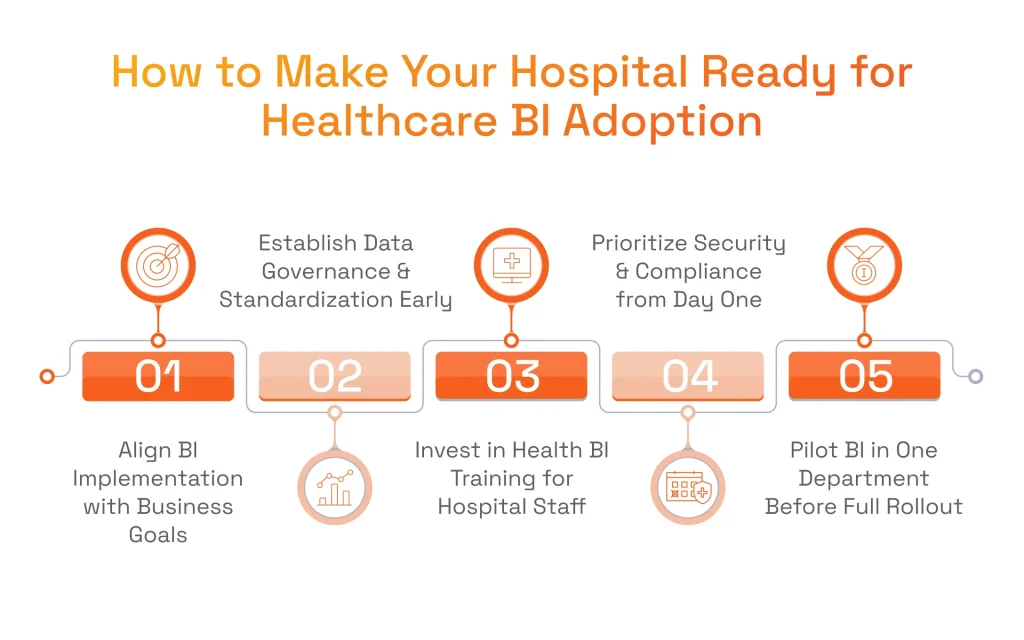
1. Aligning Implementation of BI in Healthcare with Business Goals
It will be a good idea to start by determining how exactly BI tools help solve existing challenges of an organization. There should be clear, achievable goals for BI software, for example:
- Patient wait time reduction
- Optimizing resource allocation
- Improving patient care
It is important to ensure that the BI initiative will deliver tangible value and not just collect and store information from multiple data sources.
2. Establishing Data Governance & Standardization Early
Organizations in the healthcare industry are fully aware of the importance of data integration since they work with vast amounts of fragmented and unstructured data from EHRs, billing systems, medical devices, patient portals, and more. It is critical to implement a solid data governance framework to ensure reliable data insights and consistent reporting. Effective practices to establish effective data governance for hospital Business Intelligence software include:
- The creation of standardized data entry protocols for all departments.
- Establishing clear data ownership roles.
- Implementing data validation in real-time.
- Using industry standards like HL7 and FHIR.
3. Investing in Health Business Intelligence Training for Hospital Staff
The effectiveness of Business Intelligence tools in healthcare is strongly correlated with the staff that are using them. It is essential to conduct hands-on training sessions for different roles for available healthcare specialists with ongoing support. In some cases, Business Intelligence literacy programs should be implemented for non-technical staff.
4. Prioritizing Security & Compliance from Day One
While Healthcare organizations must comply with strict regulations like HIPAA and GDPR, implementing a BI solution elevates the security requirements for healthcare data to another level. Depending on the details of a particular project, additional security measures for healthcare Business Intelligence solutions may include the implementation of:
- Role-Based Access Control (RBAC)
- End-to-end encryption for health information
- Artificial Intelligence and the Internet-of-Things anomaly detection solutions
- Regular compliance audits.
5. Piloting Hospital Business Intelligence in One Department Before Full Rollout
Finally, it makes sense to focus on a phased approach. For example, the implementation of a Business Intelligence hospital solution will be much more impactful, less disruptive, and measurable when focused on a particular department before going across an entire organization. Launching hospital Business Intelligence in a single department allows for proper testing, refining, and validation, reaching the peak performance of the innovation.
The Challenges of Adopting Business Intelligence in Healthcare Industry
So, there is a massive transformative potential of Business Intelligence for hospitals and other healthcare institutions. However, there is a set of challenges that need to be addressed to maximize the possible benefits. We, at SPD Technology, understand how to deal with these obstacles and would like to share our solutions to common problems.
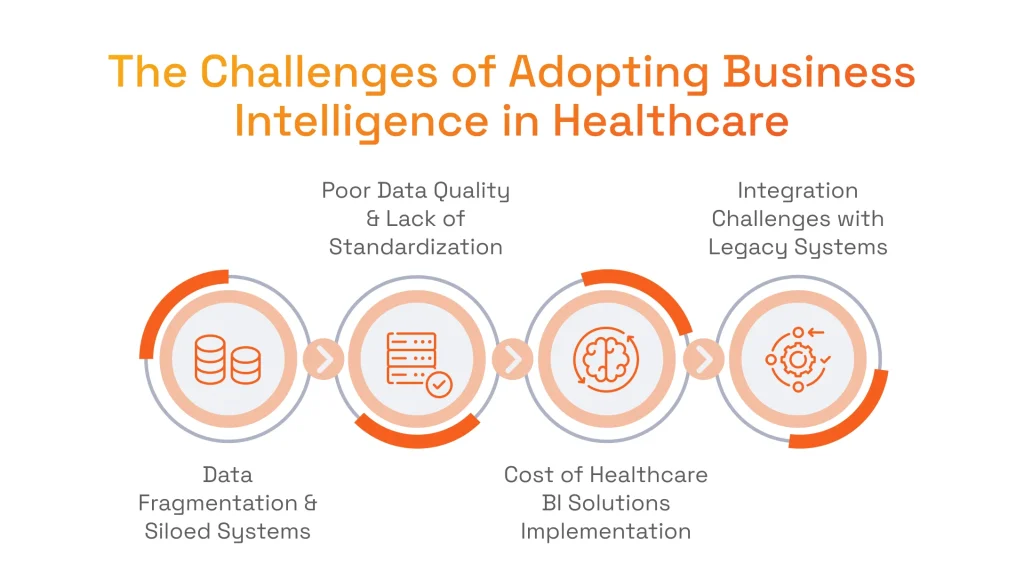
Data Fragmentation & Siloed Systems
The bigger the organization is, the more prominent the problem of data being scattered across multiple disparate systems becomes. 68% of business leaders regard data silos as the top concern in 2025, according to the survey by Dataversity.
The fragmentation across EHRs, billing systems, medical devices, and third-party applications leads to inefficient workflows, incomplete patient records, and major difficulties in gaining actionable insights from Healthcare analytics applications.
Our enterprise data strategy for these cases includes effective ways to implement data integration and interoperability solutions to eliminate silos. Our experts implement centralized data warehouses, build real-time data pipelines, and provide secure API-based integrations.
Poor Data Quality & Lack of Standardization
Another critical issue with data in the healthcare industry is inconsistency in its formats, record duplication, and inaccurate patient information. Poor data quality weakens the performance of Business Intelligence tools and may result in misdiagnoses and compliance risks.
We have profound experience in data cleansing, validation, and governance frameworks that ensure data accuracy and consistency. Our data analysts excel at setting up automated ETL processes, conducting AI-driven data deduplication, and building standardized data models.
Cost of Healthcare Business Intelligence Solutions Implementation
As mentioned previously, implementing a custom healthcare Business Intelligence solution requires investments from the very start, which include expenses on infrastructure, staff, and maintenance. This high implementation cost can slow down business processes by straining down financial resources.
SPD Technology helps clients optimize costs by leveraging cloud computing infrastructure benefits. We know how to build cloud-based BI solutions with modular architecture and individual development strategies that align with the budget constraints of our clients without any compromise in quality.
Integration Challenges with Legacy Systems
It is common for many financial institutions to rely on outdated systems that were not designed with any healthcare Business Analytics in mind. Integrating modern tools can take a significant amount of time and effort, as critical systems should be modernized. The advantages of strategic technology consulting and implementation with our company include seamless system integration with the usage of custom middleware, HL7/FHIR interoperability standards, and API-driven solutions. We will ensure that cutting-edge Healthcare analytics tools will work in harmony with existing systems without any disruptions to critical processes.
Unlock the Power of Healthcare Intelligence with Expert Assistance
Proper implementation of healthcare Business Intelligence solutions goes far beyond integrating data analytics tools, as it requires technical proficiency, a deep understanding of the industry, and a complete understanding of the complexities of regulatory requirements.
Seeking professional support for health Business Intelligence solutions may be the wisest option due to the ability of professionals to navigate the complexities of compliance regulations, including HIPAA, GDPR, and the HITECH Act. Experienced vendors are skilled in providing data analytics services, covering every aspect, from data collection to delivering accurate real-time reports.
True professionals can easily handle the development of customized ETL pipelines and interoperability solutions to ensure smooth data flow across all sub-systems without disruption of daily operations. As a result, you will receive faster deployment timelines through pre-built BI frameworks and the usage of industry best practices, reduced implementation risks without getting into common pitfalls, and scalable healthcare BI software design.
SPD Technology as Your Healthcare Business Intelligence Software Development Partner
With 19+ years of software development experience and a team of 600+ experts, our portfolio includes successful BI tools for healthcare companies. Using our expertise, we optimized workflows and resource allocation for multiple healthcare organizations. For instance, in our recent Healthcare Intelligence project, we accelerated high-risk patient identification by 45% for our client.
We have a reputation as a trusted Business Intelligence developer, building scalable custom solutions with data warehousing, predictive and prescriptive analytics, real-time reporting, and cloud computing. Our experts fully understand the importance of compliance regulations in the healthcare industry, as we know how to comply with the essential industry standards.
In every project, we hold end-to-end cybersecurity as the main priority. Our approach includes sophisticated data encryption, as well as features like Role-Based Access Controls (RBAC), and Multi-Factor Authentication (MFA). We are advocates of proactive threat detection and security monitoring, maintaining continuous protection against evolving cyber risks.
Designing Robust BI Healthcare Solutions – SPD Technology’s Successful Project
Business Challenge
Our client is an established, high-demand business in the healthcare industry. The challenge was to find a solution for effective data quality management since the existing platform had struggled and ended up with data silos, slow reporting, and inefficient analytics. We were chosen to develop a scalable, high-performance BI healthcare solution completely from scratch.
SPD Technology Approach
For this project, we assembled a diverse, dedicated team with previous experience in similar solutions. By developing and implementing this project, we completely reimagined the client’s BI infrastructure, solving key challenges in data integration and performance.
We started with designing and implementing a centralized data warehouse that helped aggregate clinical data, as well as financial reports, to enable unified analytics. For data visualization, we used Power BI and Tableau and created interactive dashboards with real-time insights.
This is one of the numerous cases in which we leveraged our expertise in machine learning development to implement advanced predictive analytics features. In particular, we introduced functionality that enabled our client to predict patient admission rates, identify high-risk patients, and optimize resource allocation.
Last but not least, we incorporated HIPAA-compliant data encryption into the solution, as well as access control mechanisms, and automated compliance tracking, ensuring adherence to healthcare regulations.
Value Delivered
- Streamlined Decision-Making: our solution allowed the client to reduce reporting times from hours to mere minutes.
- Improved Operational Efficiency: we found a way to optimize resource utilization by 35%, setting up more efficient workflows.
- Modern Future-Proof Solution: the new BI infrastructure is capable of supporting thousands of patient records, ensuring scalability for a long-term perspective.
Ultimately, we showcased here the exceptional proficiency of our specialists, and delivered a cutting-edge BI in healthcare solution, exceeding the expectations of the client.
Conclusion
The opportunities that Business Intelligence for healthcare industry unlocks are truly remarkable and will become even more effective as the technology evolves. The market for Business Intelligence for healthcare in USA alone is projected to reach USD 15.13 billion by 2034, according to Precedence Research, driving even more technological breakthroughs.
By implementing an effective data management strategy, organizations will be able to achieve unprecedented levels of efficiency, risk management, service quality, and patient care. Whether it is a hospital with some challenges in patient flow, a pharmaceutical company with dated research processes, or an insurer battling fraud, Business Intelligence has already arrived to add value.
Are you willing to take the step to harness the power of this innovation? We, at SPD Technology, are here to help you with business transformation and offer you cutting-edge Business Intelligence solutions to make the most out of your data. Feel free to contact us, and we will find an individual approach to your specific case!
FAQ
What is Business Intelligence in Healthcare?
This term refers to the implementation of data analytics, reporting tools, and AI-driven insights to help healthcare providers improve decision-making, as well as patient care. Business Intelligence in this industry includes the collection, processing, and visualization of healthcare data from different sources.
Why is Business Intelligence Important in Healthcare?
It presents several major benefits to the Healthcare industry, including:
- Better patient outcomes thanks to personalized treatments and early disease detection.
- Optimized operational efficiency due to streamlined hospital operations.
- Cost reduction as a result of demand prediction and the identification of inefficiencies.
- Adherence to regulatory compliance, including HIPAA and other relevant regulations.
- More precise strategic decision-making for organizations.
What is the Use of Business Intelligence in Healthcare?
Healthcare BI serves multiple purposes, including:
- Patient care optimization
- Operational management
- Financial and revenue cycle management
- Regulatory compliance and risk management
- Public health monitoring.
How Would the Healthcare Industry Use Business Intelligence?
Healthcare analytics and Business Intelligence cover multiple critical areas, including:
- Improving patient flow, monitoring conditions, and optimizing costs for hospitals and clinics.
- Analyzing clinical data, forecasting drug demand, and optimizing supply chains for pharmaceutical companies.
- Detecting fraud, assessing risks, and offering personalized insurance plans for insurers.
- Tracking epidemic trends, allocating resources, and implementing preventive measures for government and public agencies.
How is Business Intelligence Used in Healthcare?
There are effective ways to apply healthcare BI solutions in real-life scenarios, as proven tools, methods, and technologies include:
- Dashboards and reporting tools
- Predictive analytics functionality
- Artificial Intelligence and Machine Learning
- Data warehousing.


